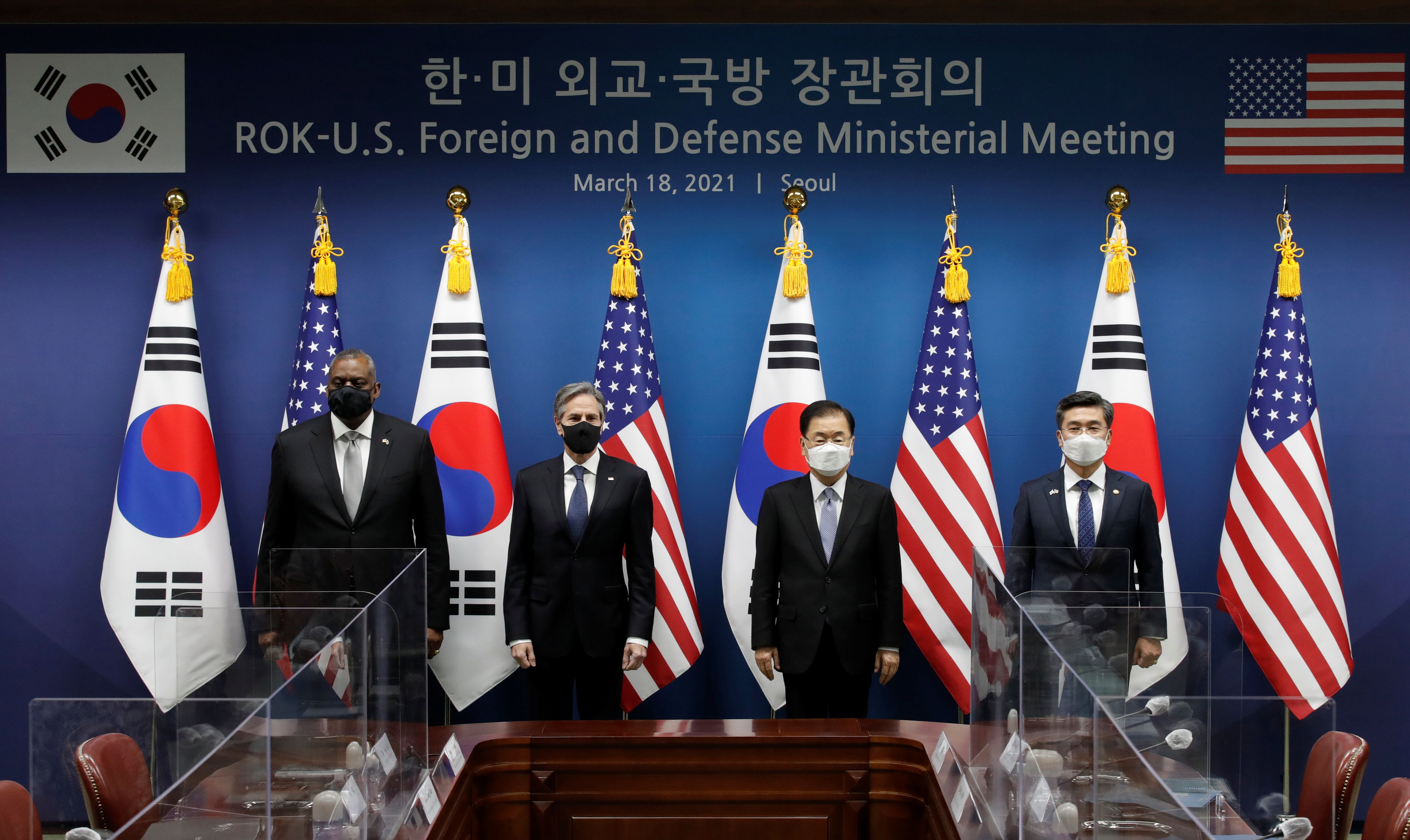U.S. Secretaries of State and Defence Visit Japan and South Korea

What were the circumstances of the visits?
Secretaries Blinken and Austin chose Japan and South Korea as their first foreign visits, which indicates that the U.S. is prioritising its allies in East Asia. The visits also confirm the overriding importance of Asia and the Pacific—now widely defined by the Americans as a single region, the Indo-Pacific—in the foreign and security policy of the Biden administration. An expression of this was the virtual summit of the leaders of the Quad countries held before the secretaries’ visits to Japan and South Korea. In addition, after visiting Tokyo and then Seoul, Austin travelled to India and Blinken flew to Alaska where, accompanied by National Security Adviser Jake Sullivan, he met with Chinese representatives—the director of the Foreign Affairs Committee of the Central Committee of the CCP, Yang Jiechi, as well as State Councillor and Minister of Foreign Affairs Wang Yi.
What was agreed in Japan?
The meetings of the secretaries with Japanese Foreign Minister Motegi Toshimitsu and Defence Minister Kishi Nobuo confirmed the close allied ties. The U.S. remains committed to the defence of Japan, including the Senkaku/Diaoyu islands, claimed by both Japan and China. In turn, Japan intends to increase its defence capabilities to strengthen the alliance. Both countries share the vision of a free and open Indo-Pacific, a concept introduced in 2016 by Japan and then adopted by the U.S. The partners indicated China as a multifaceted challenge for them and the whole world, opposing Chinese actions against countries of the region, activity in the Taiwan Strait, and violations of human rights in Hong Kong and Xinjiang. They emphasised the importance of cooperation with the democratic Quad and ASEAN countries. They also reaffirmed their commitment to the complete denuclearisation of North Korea and the need to solve the problem of Japanese citizens kidnapped by that country.
What were the talks in South Korea about?
The U.S. secretaries and South Korean Minister of Foreign Affairs Chung Eui-yong and Defence Minister Suh Wook reaffirmed that the U.S.-South Korea alliance serves as the linchpin of peace, security, and prosperity on the Korean Peninsula and the Indo-Pacific. The alliance was stabilised thanks to the signing of a multi-year agreement (extended to 2025) on the costs of stationing U.S. forces in South Korea. The parties indicated that the challenges related to North Korea’s nuclear and missile programmes—together, a priority for the alliance—require allied coordination and implementation of relevant United Nations Security Council resolutions. They opposed actions destabilising the rules-based international order, but did not mention China. South Korea noted that its New Southern Policy is consistent with the American Indo-Pacific strategy, which is to facilitate cooperation in the region.
What do the visits mean for U.S. policy towards China and the pursuing of the U.S. Indo-Pacific concept?
The visits showed discrepancies in the allies’ approach to the U.S.-China rivalry and the Indo-Pacific concept. While Japan is seen as a pillar of U.S. involvement in the region, South Korea is more cautious about the confrontational policy towards China. Japan and the U.S. share a diagnosis of the challenges arising from China’s policy and the Indo-Pacific vision. South Korea, like Japan, is committed to free and fair trade, international law, and responding to global challenges such as climate change. However, South Korea does not want a confrontation with China due to, among other things, economic interdependence and the experience of Chinese economic pressure in 2017. Differences between the U.S. and its allies and between those allies will hinder the trilateral cooperation that the parties called for during the meetings. Japanese-South Korean disputes will also undermine the pursuing of the American Indo-Pacific vision.
What is the dispute over denuclearisation?
The meetings of the representatives of the U.S., Japan, and South Korea revealed differences in the approaches to the North Korean nuclear programme. Statements by the U.S. and Japan included the phrase “denuclearisation of North Korea”, while the statements by South Korea used the more usual “denuclearisation of the Korean Peninsula”, the same as in UNSC resolutions, the six-party talks, and political declarations (including one adopted during the Trump-Kim meeting in Singapore in 2018). The use of the newer phrase, although inconsistent, may be a U.S. signal that North Korea should not count on the removal of the American “nuclear umbrella” from South Korea. The South, in turn, argues that using the usual term increases the chances of resuming talks with North Korea. In addition, South Korea treats denuclearisation as one element of its activities within the peace process on the Korean Peninsula alongside the inter-Korean dialogue and non-nuclear aspects of security.
What may be the consequences of the visits for the situation on the Korean Peninsula and in U.S. relations with allies?
The consultations with Asian allies were part of a review of U.S. policy towards North Korea. If the Biden administration maintains its stance on denuclearisation, it will make it difficult to re-start negotiations with North Korea because the U.S. rhetoric means a demand of unilateral nuclear disarmament. The stalemate may induce North Korea to military provocations. Blinken’s suggestions that the North Korean nuclear problem requires China’s involvement indicates that this issue may appear on the U.S.-China agenda. The dispute between the U.S. and South Korea around the denuclearisation phrase shows that the stabilisation of the alliance and deeper consultations with the Biden administration do not guarantee agreement even on key issues. The visits to Japan and South Korea showed that despite the will to cooperate, the U.S. may not incorporate many of the demands and expectations of its allies, including European ones.


